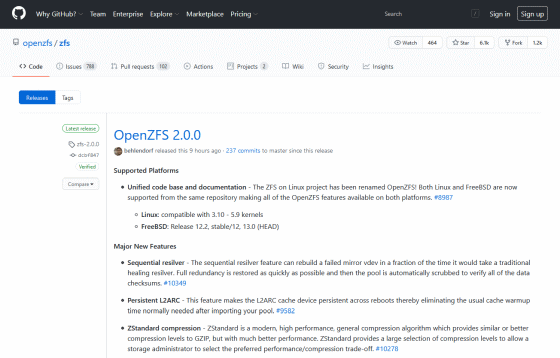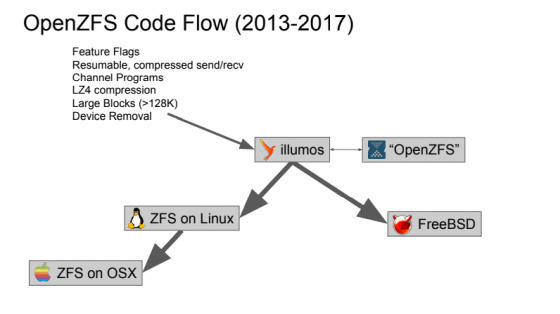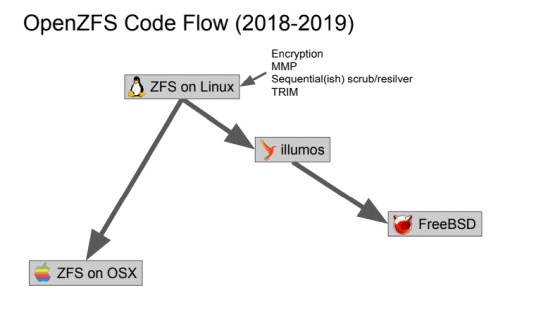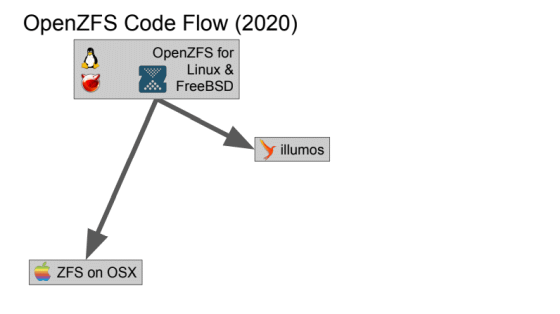New release of 'Open ZFS 2.0' from ZFS on Linux, equipped with pL2ARC, Zstandard compression, etc.

On December 1, 2020, the open source implementation of the file system
Release OpenZFS 2.0.0 · openzfs / zfs · GitHub
https://github.com/openzfs/zfs/releases/tag/zfs-2.0.0

(PDF) OpenZFS DevSummit 2019
ZFS is the successor to the Unix File System used in Solaris , and is an advanced file system equipped with snapshot, copy-on-write , and RAID functions. The open source implementation of ZFS could not be merged into the Linux kernel due to licensing issues, and it was developed as an external kernel module 'ZFS on Linux', and was named 'Open ZFS' at the same time as this major update. Has changed.
The supported OS is Linux 3.10 to 5.9, FreeBSD 12.2, stable / 12, 13.0, and from OpenZFS 2.0, the repositories that support Linux and FreeBSD are integrated. The main features added in OpenZFS 2.0 are as follows.
· Continuous resynchronization: Rebuilding a destroyed mirroring virtual device (vdev) is faster than traditional resynchronization.
-Permanent L2ARC: ZFS can improve the reading speed by using the cache function L2ARC, but the conventional L2ARC is volatile in which data is lost when the power of the PC is turned off. Starting with OpenZFS 2.0, it has a persistent L2ARC that can retain data even after a reboot, which is said to reduce cache warm-up time.
-Zstandard compression: In addition to compression methods such as GZIP, LZ4, and ZLE, the high-performance compression format 'Zstandard' developed by Facebook can now be used.
-Stream editing function when performing zfs send / receive : A function has been added that allows you to edit the data stream when sending and receiving data with zfs send / receive, excluding unnecessary data and confidential information.
-Command performance improvements and changes: The zfs command performance has been improved and some options have been changed.
ZFS is being used on Linux, with Ubuntu 20.04 Desktop being able to be used as a root partition, albeit on a trial basis. However, Linux developer Linus Torvalds is not merging ZFS into the Linux kernel, and the Linux kernel does not support ZFS. The reason is that the license that ZFS follows is not the same GNU GPL as Linux, but the CDDL specified by Sun Microsystems. When using ZFS on Linux, it was necessary to use an external module, ZFS on Linux.
Like ZFS on Linux, OpenZFS, known as an open source ZFS implementation, has undergone numerous improvements through the development of a Solaris-based OS called illumos , and has been incorporated into FreeBSD and others.

However, it had been responsible for the majority of ZFS development in illumos

In response to such a trend, ZFS on Linux supported FreeBSD and at the same time changed the project name to 'OpenZFS', which is the reason for this major release. The major update 'OpenZFS 3.0' scheduled for 2021 aims to support macOS.

Related Posts:
in Software, Posted by darkhorse_log







